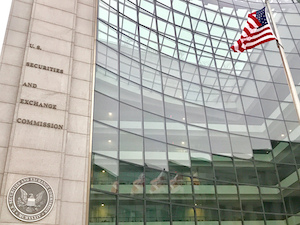 The Securities and Exchange Commission on July 13 voted 3-2 to rescind two Trump-era rules on proxy voting advice businesses that the Commission adopted in 2020.
The Securities and Exchange Commission on July 13 voted 3-2 to rescind two Trump-era rules on proxy voting advice businesses that the Commission adopted in 2020.
The amendments approved by the SEC rescind conditions in Rule 14a-2(b)(9)(ii) to the availability of two exemptions from the proxy rules’ information and filing requirements on which proxy voting advice businesses often rely and related guidance to investment advisers:
- Those conditions required proxy advisory firms to make their advice available to the companies that are the subject of their advice at or before the time that they make the advice available to their clients.
- The conditions required proxy advisory firms to provide their clients with a mechanism by which they could reasonably be expected to become aware of any written statements by registrants who are the subject of the advice regarding the proxy advisory firms’ proxy voting advice.
According to the SEC, the amendments—which were proposed in November 2021—address concerns raised by institutional investors and other clients of proxy voting advice businesses that these conditions could impose increased compliance costs on proxy voting advice businesses and impair the independence and timeliness of their proxy voting advice.
“Upon further analysis in light of continued concerns expressed by investors and others, the Commission concluded that the potential informational benefits to investors of these conditions do not sufficiently justify the risks they pose to the cost, timeliness, and independence of proxy voting advice,” the SEC states in a fact sheet. As such, the SEC notes that it is rescinding Rule 14a-2(b)(9)(ii) and the related safe harbors and exclusions from those conditions.
2020 Supplemental Proxy Voting Guidance
In connection with the 2020 rules, the Commission issued supplemental guidance to investment advisers about their proxy voting obligations. The SEC notes that the supplemental guidance was prompted in part by the Commission’s adoption of the conditions set forth in Rule 14a-2(b)(9)(ii). The adopting release rescinds the supplemental guidance, noting consideration of comment letters on the November 2021 proposing release and existing obligations and considerations regarding proxy voting under the Investment Advisers Act of 1940.
Liability Rule
The final amendments also delete the 2020 changes made to the proxy rules’ liability provision. The 2020 changes were intended to clarify the application of this liability provision to proxy voting advice, but the SEC suggests that instead they “created a risk of confusion regarding the application of this provision to proxy voting advice, undermining the goal of the 2020 changes.”
To that end, they remove Note (e) to Rule 14a-9a that provided examples of situations in which the failure to disclose certain information in proxy voting advice may be considered misleading within the meaning of the proxy rules’ prohibition on material misstatements or omissions.
Not a Wholesale Reversal
Note that the final amendments do not reverse the 2020 rules completely. Proxy voting advice generally remains a “solicitation” subject to the proxy rules, including liability under Rule 14a-9 for material misstatements or omissions of fact.
In addition, proxy advisory firms generally would still be subject to the conflicts of interest disclosure requirements adopted in 2020. As such, to rely on the exemptions from the proxy rules’ information and filing requirements set forth in Rules 14a-2(b)(1) and (3), proxy voting advice businesses (PVAB) will still have to satisfy Rule 14a-2(b)(9)’s conflicts of interest disclosure requirements.
The SEC explains that the deletion of Note (e) does not affect the scope of Rule 14a-9 or its application to proxy voting advice. “As with any other person engaged in a solicitation as defined in Rule 14a-1(l), a PVAB may be liable under Rule 14a-9 for a material misstatement of fact, or an omission of material fact, including, depending on the facts and circumstances, with regard to its methodology, sources of information, or conflicts of interest,” the SEC notes.
The final amendments and the rescission of the guidance will be effective 60 days after the date of publication in the Federal Register.
Amendments to Shareholder Proposal Rule
Meanwhile, the SEC also on July 13 voted 3-2 to propose amendments to the rule that governs the process for including shareholder proposals in a company’s proxy statement.
Under Rule 14a-8, companies generally must include shareholder proposals in their proxy statements. The rule, however, provides several bases for exclusion, including several requirements that proposals must comply with to avoid exclusion. The proposed amendments would revise three of the bases for exclusion to promote more consistency and predictability in application, the SEC explained in a release.
- Substantial Implementation. The proposed amendments would specify that a proposal may be excluded under this provision if the company has already implemented the “essential elements” of the proposal.
- Duplication. The proposed amendments would specify that a proposal “substantially duplicates” another proposal previously submitted for the same shareholder meeting if it addresses the same subject matter and seeks the same objective by the same means.
- Resubmission. The proposed amendments would provide that a proposal constitutes a resubmission if it substantially duplicates another proposal that was previously submitted for the same company’s prior shareholder meetings.
When shareholders buy stock in a public company, they own a piece of the company, which comes with certain rights under state law, including the right to elect directors to the company’s board and the right to make proposals to the management team for consideration by fellow shareholders, explained SEC Chair Gary Gensler. “I believe these proposed amendments would provide a clearer framework for the application of this rule, which market participants have sought,” he explained. “They also would help shareholders exercise their rights to submit proposals for consideration by their fellow shareholders.”
A public comment period will remain open for 60 days following publication of the proposal on the SEC’s website or 30 days following publication in the Federal Register, whichever period is longer.

